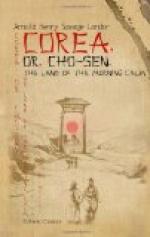“Era, Era, Era!” ("Make way, Make way!”) cry out the servants as he passes among the crowd, which is invariably respectful and ready to obey this hero who looks down upon them. The lesser the official, of course the greater the air, and you should see how the people who stand in the way are knocked to one side by his servants, should they not be quick enough to make room for the dignitary and his donkey. His long gown is carefully arranged on the sides and behind, covering the saddle and donkey’s back in large folds; for most things in Corea, as in other parts of the world, are done for the sake of appearance. What a dreadful thing it would be, were he to ride about with his gown crumpled up under his seat! It would be the cause of lifelong unhappiness, remorse and shame, and no doubt cost his servants a sound flogging for their unpardonable carelessness.
CHAPTER V
The Woman of Cho-sen—Her clothes—Her ways—Her looks—Her privileges—Her duties—Her temper—Difference of classes—Feminine musicians.
It will now be proper, I think, since I have given you a rough sketch of the man of Cho-sen and his clothes, to describe in a general way to you the weaker sex—not an easy task—and what they wear—a much more difficult task still,—for I have not the good fortune to be conversant with the intricacies of feminine habiliments, and therefore hope to be excused if, in dealing with this part of my subject, I do not always use the proper terms applicable to the different parts that compose it. Relying, then, upon my readers’ indulgence in this respect, I shall attempt to give an idea of what a Corean female is like. It has always been a feature in my sceptical nature to think that the more one sees of women the less one knows them; according to which principle, I should know Corean women very well, for one sees but little of them. Be that as it may, however, I shall proceed to give my impressions of them.
As is pretty generally known, the women of Cho-sen, with the exception of the lower classes, are kept in seclusion. They are seldom allowed to go out, and when they do they cover their faces with white or green hoods, very similar in shape to those worn by the women at Malta. They appear, or pretend to be, shy of men, and foreigners in particular, and generally hide when one is approaching, especially if in a solitary street. I remember how astonished I was the first few days I was in Seoul, at the fact that every woman I came across in the streets was just on the point of opening a door and entering a house. It seemed so strange to me that damsel after damsel whom I met should just be reaching home as I was passing, that I began to think that I was either dreaming, or that every house belonged to every woman in the town. The idea suddenly dawned upon me that it was only a trick on their part to evade being seen, and on further inquiry into the matter from a Corean friend,




